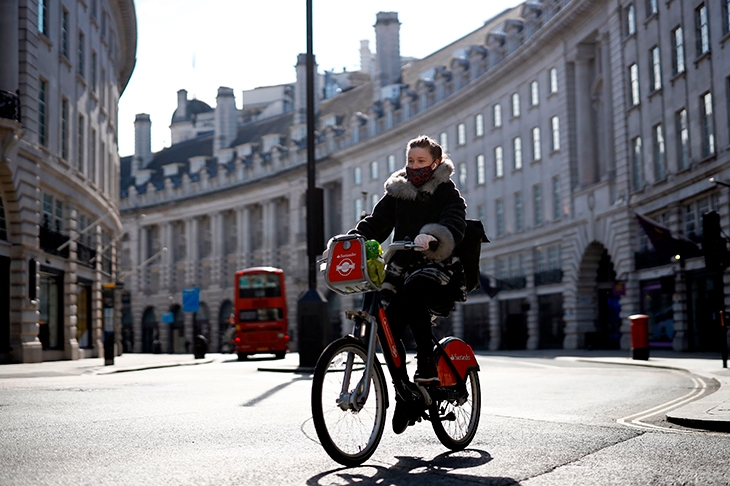I realized things were getting back to normal when I threw away a third of a tin of chopped tomatoes last week. Back in March you couldn’t get them for love or money. I still remember the appalled look on a woman customer’s face at our local farm shop, in mid-April, when she was told that, while the store was out of tinned tomatoes, she could have real ones instead. ‘That’s not the same,’ she said, with a degree of rancor. ‘Um…if you chopped them up with a knife, I think they’d be pretty similar. You know?’ she was informed, but she wouldn’t have it and stomped off. There was always something a little spurious about those early shortages, with people panic-buying yeast when the shelves were stocked with loaves of bread. The run on hand sanitizer, as if it were like those nosegays of herbs with which people in the Middle Ages tried to ward off the plague, without success. Whole Foods totally out of manchego and nduja paste.
Anyway, I threw out the leftover tomatoes and mused that soon I would be every bit as wasteful as I was before lockdown struck and nothing of this peaceful and joyous lacuna would remain with me, or with anyone else. The notion that we might end up kindlier, greener, gentler as a consequence of our brush with this ineffectual Armageddon was always horribly misplaced. The only lasting impact will be that reform of the cumbersome and often fantastically inept National Health Service will be off the cards in perpetuity and instead we will probably still be forced to kneel down before it every Thursday evening to give praise, clutching a used face mask in lieu of a rosary.
In John Updike’s excellent but very unfashionable (now) 1968 novel Couples, sex replaces God as a religion. Today in the UK the NHS has replaced God. It is utterly beyond criticism, beyond human reckoning, a glorious beacon of state-funded socialist multicultural brilliance, better than anything anywhere else in the world. Au contraire. Every year the Health Consumer Powerhouse ranks healthcare systems continent wide. The UK has never been in the top ten (no, not even when Labour was in office) and its latest standing is 16th, below Estonia, Portugal and the Czech Republic. Bloomberg’s annual ranking of worldwide healthcare efficiency puts the UK’s NHS at 36th out of 56 for 2018.
And nor has the performance of the NHS during this crisis been beyond reproof either. But God help any politician who dares suggest such a thing in the next few years. The vast maw of the NHS will continue to swallow up utterly unfeasible amounts of taxpayers’ money and even then it will not be enough. Nothing, with the NHS, is ever enough. I don’t doubt the excellence of our doctors or the dedication of our nurses: it is the hideously bureaucratic system under which they labor that needs reform. But it will not get reform. It will get more money from us instead.
I call it an ineffectual Armageddon because still, even by now, the vast majority of us remain untouched by it, which is not the way Armageddons are meant to work. The plague which has brought this country to a standstill has infected 233,000 people, or about 0.3 percent of the population, according to official figures. There may be many unrecorded cases however. It’s still less than 10 percent who have copped COVID and 0.05 percent who have died from it. This has led many people, especially on the right, to believe that the government has overreacted and that lockdown should be lifted now to preserve not only our economy but also the lives of those who might die from other causes as a result of social isolation, or delayed hospital treatment. And yet although those COVID figures are, in the grand scheme of things, small, they are a singularity in modern times: this is not Sars, or bird flu — no prime minister found himself hovering between life and death in hospital during those outbreaks.
This is markedly different in both its potential reach and potential lethality and to argue otherwise, with those callous stats, seems to me obtuse. The government was right to impose lockdown, and should have imposed it a while sooner. It should also have restricted entry to our country (those flights are still arriving) at the beginning of March. Matched against other European countries and the USA, Boris and co have performed at mid-table level — but the opinion polls suggest the country is still with them, the latest showing a 16 percent lead over the ectoplasmic Keir Starmer’s Labour party. The opinion polls also suggest that by a very large margin, people are wary of loosening the lockdown restrictions — and here again, much as over Brexit, the public is right and London and our ruling class are wrong.
The clamor to get us out of lockdown is a lot louder than that large majority who wish lockdown to remain in place for a while longer. It has traction within government. I accept it seems to be the view of most people who read this magazine, to judge from the comments. And yet it is a kind of non-sequitur. If you think we are right to abandon or dilute lockdown now, then you should not have been in favor of it in the first place, because we are only about halfway through the process of restricting the spread of the virus. And if you thought we should not have been under lockdown in the first place, then you would be unmoved by five times the number of elderly and vulnerable people dying of this disease than is the case at present.
The clamor to abandon lockdown is not based upon rationality, but upon impatience and boredom and inconvenience. And the worrying thing for me is that the government is listening to that loud minority and not to the mass of people.
This article was originally published in The Spectator’s UK magazine. Subscribe to the US edition here.


















